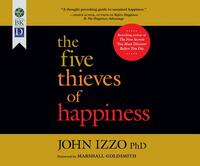Take a photo of a barcode or cover
hopeful
inspiring
lighthearted
reflective
fast-paced
I picked this up on a whim at the library and enjoyed it on many levels.
I was wary at first, after learning that Izzo is a Christian minister and there were some allusions to a religious take on happiness. But I was pleased to see that he embraces scientific concepts (Big Bang theory, evolution, etc) and gives a balanced view of ethics, morality and spirituality. It is not a book of religion.
The 5 thieves are distilled from the 7 Buddhist virtues, the 7 deadly sins, the 10 commandments, the 7 essential Sikh values and other familiar virtues. The thieves and their oppostional forces are:
Control - trying to control your past (regret) or your future (worry), trying to control others or having an expected outcome.
The oppositional force is surrender. We need to stay in the present and focus on our own actions in order to find happiness.
Conceit - being focussed on ourselves and surrounding ourselves only with like-minded thinkers, which causes us to think we are above other people or distanced in some way.
The oppositional force is service. By giving and helping others, we develop connection to those we might not otherwise encounter. Listening to divergent opinions allows for a more open mind and a feeling of being part of a larger entity.
Covet - being envious or jealous and wanting something outside of ourselves.
The oppositional force is gratitude Reflect on what you have, your gifts, talents, relationships and find happiness within things/people/ideas that you already have.
Consumption - looking outside yourself for 'things' that will make you happy, like a fancier house, a better job, a nicer car (usually things that can be bought)
The oppositional force is contentment. You have a choice to be happy with what you have. Look within yourself for contentment and satisfaction and realise that some new doo-dad is not going to create happiness. Choose to be happy now.
Comfort - being lulled into complacency because change is unsettling and habits hold us in place. We stick to patterns that we have established which may not be healthy or enriching.
The oppositional force is novelty. The times when we feel most alive are times when we have stepped out of comfort, tried something new (a new sport, a new relationship, a new environment) and taken a risk. Happiness is found in excitement and change.
The book expands on each thief with examples in society, in the world and from the author's experiences. He suggests ways to remove the thieves - notice each of them in your daily life, stop tolerating them and replace these habits with the opposite virtue.
I was wary at first, after learning that Izzo is a Christian minister and there were some allusions to a religious take on happiness. But I was pleased to see that he embraces scientific concepts (Big Bang theory, evolution, etc) and gives a balanced view of ethics, morality and spirituality. It is not a book of religion.
The 5 thieves are distilled from the 7 Buddhist virtues, the 7 deadly sins, the 10 commandments, the 7 essential Sikh values and other familiar virtues. The thieves and their oppostional forces are:
Control - trying to control your past (regret) or your future (worry), trying to control others or having an expected outcome.
The oppositional force is surrender. We need to stay in the present and focus on our own actions in order to find happiness.
Conceit - being focussed on ourselves and surrounding ourselves only with like-minded thinkers, which causes us to think we are above other people or distanced in some way.
The oppositional force is service. By giving and helping others, we develop connection to those we might not otherwise encounter. Listening to divergent opinions allows for a more open mind and a feeling of being part of a larger entity.
Covet - being envious or jealous and wanting something outside of ourselves.
The oppositional force is gratitude Reflect on what you have, your gifts, talents, relationships and find happiness within things/people/ideas that you already have.
Consumption - looking outside yourself for 'things' that will make you happy, like a fancier house, a better job, a nicer car (usually things that can be bought)
The oppositional force is contentment. You have a choice to be happy with what you have. Look within yourself for contentment and satisfaction and realise that some new doo-dad is not going to create happiness. Choose to be happy now.
Comfort - being lulled into complacency because change is unsettling and habits hold us in place. We stick to patterns that we have established which may not be healthy or enriching.
The oppositional force is novelty. The times when we feel most alive are times when we have stepped out of comfort, tried something new (a new sport, a new relationship, a new environment) and taken a risk. Happiness is found in excitement and change.
The book expands on each thief with examples in society, in the world and from the author's experiences. He suggests ways to remove the thieves - notice each of them in your daily life, stop tolerating them and replace these habits with the opposite virtue.
hopeful
medium-paced
I really enjoyed the insights in the chapters on control and coveting. But it sometimes was self-explanatory, and the idea of the thieves didn’t make total sense until the book contradicted itself in the end. I will try the mantras and perhaps report back if the book continues to be valuable long-term.
I was not sure what to expect when I randomly checked out The Five Thieves of Happiness from my library but I definitely was not expecting to read one of my new favorite "self-help" books. I absolutely loved this book!
The author does write the book from the perspective of a Christian, but what truly made the book timeless for me is his incorporation of other faiths into his creation of the five thieves of happiness. The five thieves of happiness are control, conceit, coveting, consumption, and comfort. John Izzo draws inspiration from the major religions of the world to demonstrate that the keys to happiness are not elusive; humans for millenniums have unrooted these truths. Izzo breaks down why so many faiths emphasize the importance of not allowing these thieves to take away our happiness and how even though avoiding these thieves is often foundational to our belief system, we still fall prey to them. Izzo helps us to recognize why we struggle with the thieves and how we can overcome them.
If you are open-minded and willing to reflect on your life and your values, I definitely recommend picking up this book.
The author does write the book from the perspective of a Christian, but what truly made the book timeless for me is his incorporation of other faiths into his creation of the five thieves of happiness. The five thieves of happiness are control, conceit, coveting, consumption, and comfort. John Izzo draws inspiration from the major religions of the world to demonstrate that the keys to happiness are not elusive; humans for millenniums have unrooted these truths. Izzo breaks down why so many faiths emphasize the importance of not allowing these thieves to take away our happiness and how even though avoiding these thieves is often foundational to our belief system, we still fall prey to them. Izzo helps us to recognize why we struggle with the thieves and how we can overcome them.
If you are open-minded and willing to reflect on your life and your values, I definitely recommend picking up this book.
Meh. Everything in this book is profound & true - so maybe my 3 stars is unfair. I have just done so much reading & learning about happiness and there was nothing new here.
I was not sure what to expect when I randomly checked out The Five Thieves of Happiness from my library but I definitely was not expecting to read one of my new favorite "self-help" books. I absolutely loved this book!
The author does write the book from the perspective of a Christian, but what truly made the book timeless for me is his incorporation of other faiths into his creation of the five thieves of happiness. The five thieves of happiness are control, conceit, coveting, consumption, and comfort. John Izzo draws inspiration from the major religions of the world to demonstrate that the keys to happiness are not elusive; humans for millenniums have unrooted these truths. Izzo breaks down why so many faiths emphasize the importance of not allowing these thieves to take away our happiness and how even though avoiding these thieves is often foundational to our belief system, we still fall prey to them. Izzo helps us to recognize why we struggle with the thieves and how we can overcome them.
If you are open-minded and willing to reflect on your life and your values, I definitely recommend picking up this book.
The author does write the book from the perspective of a Christian, but what truly made the book timeless for me is his incorporation of other faiths into his creation of the five thieves of happiness. The five thieves of happiness are control, conceit, coveting, consumption, and comfort. John Izzo draws inspiration from the major religions of the world to demonstrate that the keys to happiness are not elusive; humans for millenniums have unrooted these truths. Izzo breaks down why so many faiths emphasize the importance of not allowing these thieves to take away our happiness and how even though avoiding these thieves is often foundational to our belief system, we still fall prey to them. Izzo helps us to recognize why we struggle with the thieves and how we can overcome them.
If you are open-minded and willing to reflect on your life and your values, I definitely recommend picking up this book.



